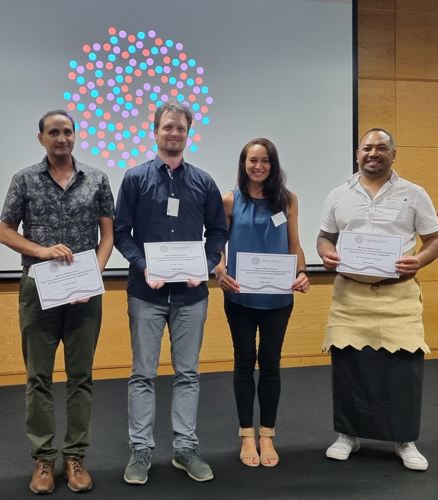Awards recognise community engagement by early career researchers
Four early-career MWC-affiliated researchers are recipients of the inaugural Early Career Researcher Award Recognising Science Excellence and Community Engagement, initiated by the Early Career Steering Committee (ECSC). The award reframes success to include a broad leadership and societal remit.

(Left to Right): MWC Early Career Researcher Award Recognising Science Excellence and Community Engagement recipients, Dr Makhdoom Sarwar, Dr Petr Tomek, Dr Natalie Netzler, and Dr Chris Puli’uvea. The award, initiated by the Early Career Steering Committee (ECSC), reframes success to include a broad leadership and societal remit.
Forming specialist cancer networks and delivering accessible information to Māori rōpu and whanau, driving sustained community vaccine education, and fundraising for research through classical performances and big band tunes are among the weighty efforts of the inaugural ECSC recipients.
Dr Natalie Netzler, MWC Associate Investigator, and MWC Affiliate Investigators Drs Makhdoom Sarwar, Petr Tomek, and Chris Puli’uvea were recognised for their extensive work as excellent scientists and good global citizens. Alongside the demands of their cutting-edge research, each was noted for their ongoing efforts to build networks, forge stronger community connections and lift public awareness and understanding around issues of biomedical research.
Dr Makhdoom Sarwar formed and led the Otago Gynae Cancer group linking researchers in Dunedin, Wellington and Christchurch. A research fellow in gynaecologic oncology at the University of Otago in Christchurch, Makhdoom was instrumental in establishing two scientific forums: the Gynaecological Cancer League and the NZ Gynae Cancer Group. He is involved with the MWC Otago Early Mid-Career Research group and initiated an outreach initiative to engage communities in biomedical and clinical research advancements, which, in turn, led to the formation of the Kaupapa Māori Kaunihera whakarōpū (Māori Practices Advisory Group). With the help of the advisory group, Makhdoom launched a jargon-free community newsletter for non-specialists and the community illustrating risks, clinical care, cancer research and current findings to be distributed through mārae and through collaborating networks such as the Māori Women Welfare League.
Over many years, cancer biologist, drug developer and accomplished pianist Dr Petr Tomek has used music to advance cancer research. Petr formed the acclaimed classical music group Trio Pohadka, which has toured New Zealand under the banner of “Doctors with Instruments” to entertain audiences with their engaging talent and to inform audiences about their fight against cancer. To date, the Trio Pohadka has raised close to $40,000 for cancer research.
Dr Natalie Netzler (Ngāti Ruanui, Ngāti Hauā, Samoan), a senior lecturer at UoA specialising in virology, and Dr Chris Puli’uvea, a Tongan-born immunology researcher and now an AUT lecturer, were also recognised for their community engagements. During and following the COVID-19 pandemic, Natalie and Chris undertook a mammoth workload to inform and educate Māori and Pacific communities about the science behind the COVID-19 vaccine and the importance of vaccination for individuals and communities through streams of public and media engagements. They consulted with many members of the MWC network for specific specialist advice in this complex and sometimes emotive area—showing the power of the Centre’s networks of in-depth scientific and clinical knowledge. They also managed the production of multilingual educational video material (in English, Te Reo Māori, Tongan and Samoan) for social media channels and health sites, including the Immunisation Advisory Centre and Moana Connect.
All four awardees were acknowledged at the MWC Emerging Researchers’ Showcase in February 2023 and gave engaging presentations on their outreach activities. Each received $2000 toward their research or community initiatives.